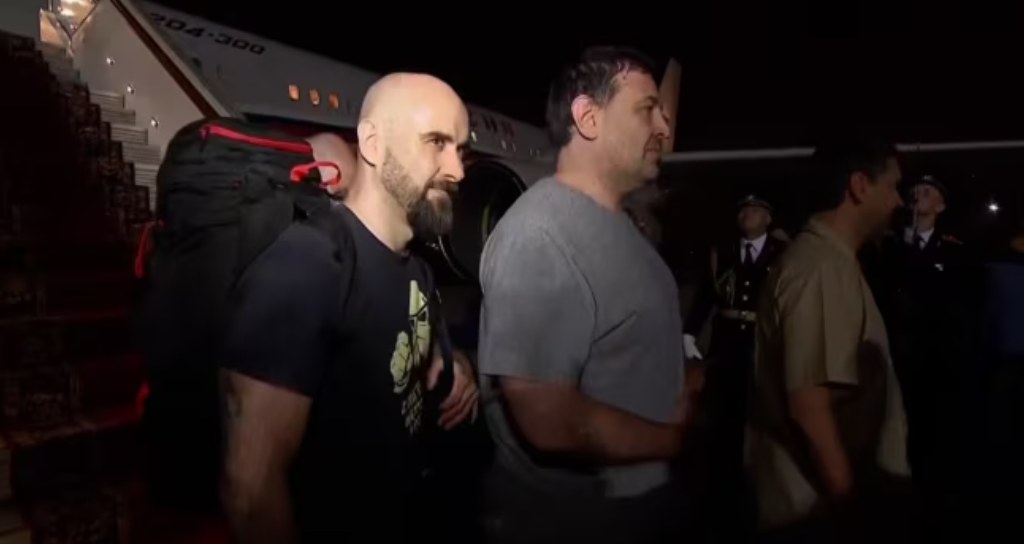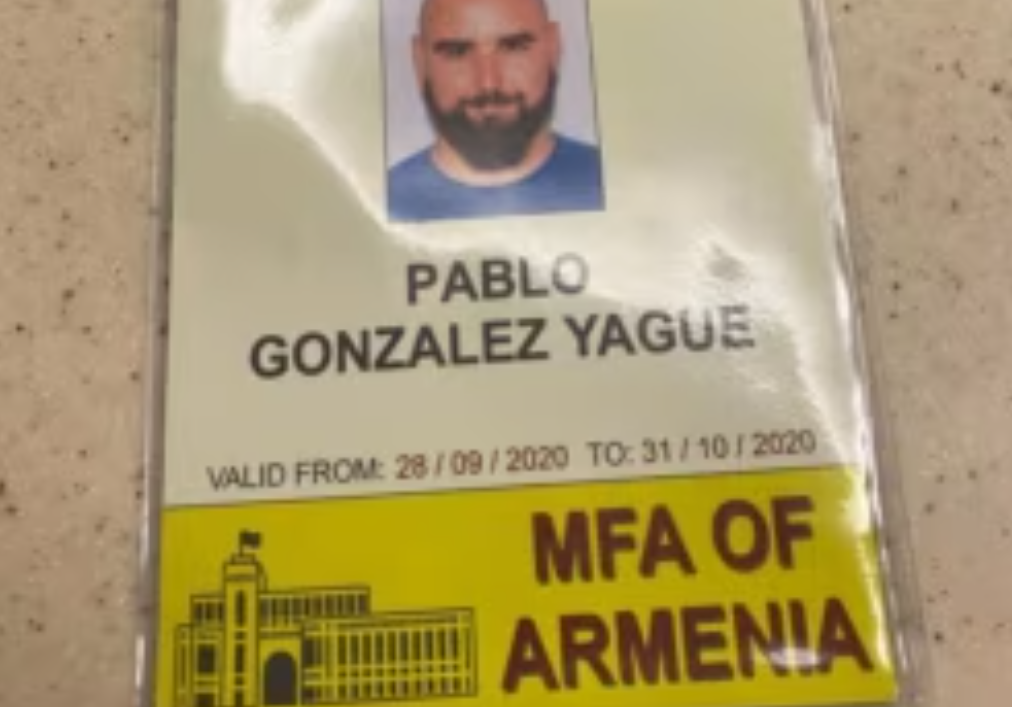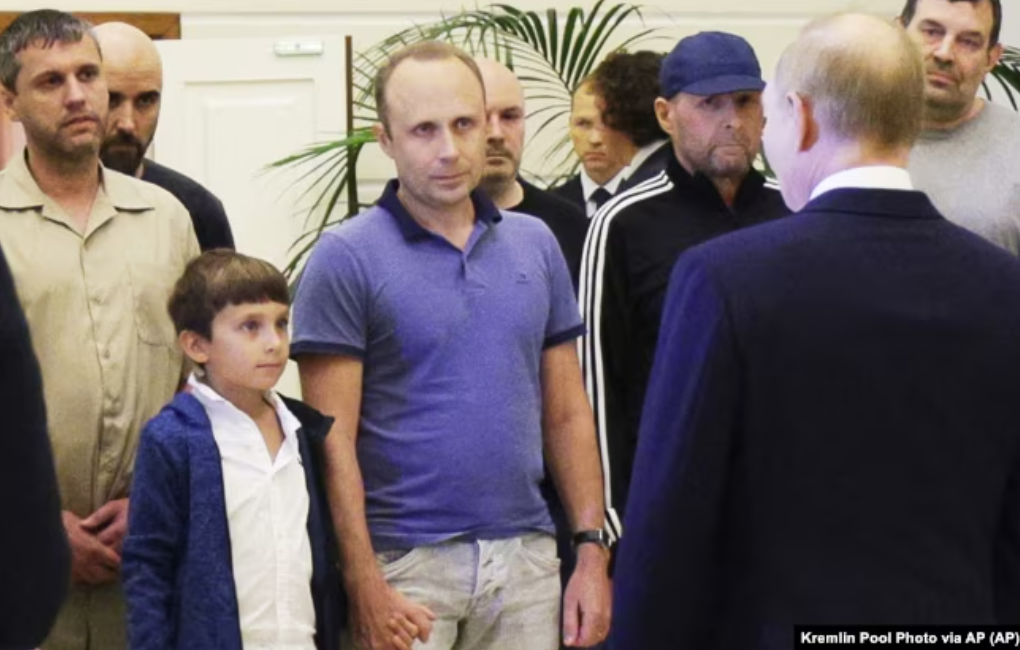Following the historic prisoner exchange between Russia and the West earlier this month, Armine, an ethnic Armenian displaced from the Nagorno-Karabakh region, watched footage of the released Russians disembarking from the plane and being welcomed at the airport by Russian President Vladimir Putin. She replayed the footage several times, unable to believe what she was seeing.
Among those returning to Russia were also Russian spies and convicted murderers. However, Armine, whose true identity is known to Radio Free Europe, recognized someone among the released: a Spanish journalist who had been a frequent visitor to Nagorno-Karabakh, particularly during heightened tensions in the region. “I met Pablo ten years ago… He introduced himself as a Spanish journalist and was eager to interview Karabakh officials, visiting seven districts around Karabakh and speaking with local residents,” Armine told Radio Free Europe’s Armenian Service.
“He made many contacts in Karabakh and was well-received. Strangely, the authorities in Karabakh – who are usually suspicious of foreigners – had no doubts about Pablo,” she added.
The person Armine recognized is Pablo Gonzalez, a Spanish-Russian independent journalist known in his Russian passport as Pavel Rubtsov. He was arrested in Poland in 2022 on charges of spying for the Russian military intelligence agency, known as GRU.
Suspected Russian Spy Infiltrated as Journalist in Nagorno-Karabakh and Armenia
Following the historic prisoner exchange between Russia and the West earlier this month, Armine, an ethnic Armenian displaced from the Nagorno-Karabakh region, watched footage of the released Russians disembarking from the plane and being welcomed at the airport by Russian President Vladimir Putin. She replayed the footage several times, unable to believe what she was seeing.
Among those returning to Russia were also Russian spies and convicted murderers. However, Armine, whose true identity is known to Radio Free Europe, recognized someone among the released: a Spanish journalist who had been a frequent visitor to Nagorno-Karabakh, particularly during heightened tensions in the region.
“I met Pablo ten years ago… He introduced himself as a Spanish journalist and was eager to interview Karabakh officials, visiting seven districts around Karabakh and speaking with local residents,” Armine told Radio Free Europe’s Armenian Service.
“He made many contacts in Karabakh and was well-received. Strangely, the authorities in Karabakh – who are usually suspicious of foreigners – had no doubts about Pablo,” she added.
The person Armine recognized is Pablo Gonzalez, a Spanish-Russian independent journalist known in his Russian passport as Pavel Rubtsov. He was arrested in Poland in 2022 on charges of spying for the Russian military intelligence agency, known as GRU.
Pablo Gonzalez (left) upon arriving in Russia on August 1, after the prisoner exchange between Russia and the West. Armine is among dozens of citizens who spoke to RFE/RL about their interactions with Gonzalez in Nagorno-Karabakh, a region primarily inhabited by ethnic Armenians before it was retaken by Azerbaijan following an attack on September 19, 2023, according to RFE/RL.
Most said they had no suspicions about Gonzalez, who, in addition to reporting on the conflict in the region, had also written about Armenia’s nuclear plant and used his status as a journalist to interview the Armenian Prime Minister and took photos inside the ruling party headquarters, Civil Contract.
People whom RFE/RL spoke with emphasized that Gonzalez, 42, showed a desire to cover the conflict. “He was not at all afraid of the war,” said Sergey Shahverdian, former director of Hotel Europe in Stepanakert, where Gonzalez had stayed.
Pablo Gonzalez Reporting from Nagorno-Karabakh During the 44-Day War in 2020
A few days after Putin launched the full-scale invasion of Ukraine in February 2022, Polish authorities arrested Gonzalez in the border town of Przemysl, through which hundreds of thousands of Ukrainian refugees fleeing the war passed.
After his arrest, Polish intelligence claimed that Gonzalez had “engaged in activities for Russia, using his status as a journalist.” Richard Moore, head of British intelligence MI6, later in 2022 stated that Gonzalez was a spy attempting to enter Ukraine as part of their destabilization efforts there.
Last week, Polish prosecutors officially charged Gonzalez, accusing him of supplying GRU with information that was potentially “damaging” to Poland and NATO, although following the prisoner exchange, he could not be apprehended by Warsaw authorities.
While Polish authorities have not officially revealed further details, earlier journalistic investigations found that Gonzalez had engaged with Russian opposition activists and compiled reports for them.
Karo Sahakian, an Armenian photographer who said he first met Gonzalez during the 2020 war over the Nagorno-Karabakh region, told RFE/RL that “I did not notice anything suspicious” about him. “I’m still not 100 percent sure,” said Sahakian. “He did not hide.”
During the 2020 war, Gonzalez stayed at Hotel Europe in Stepanakert – known as Hankendi under Azerbaijani control – hundreds of kilometers away from what would later become the Russo-Ukrainian front.
Pablo Gonzalez Posing Next to the Monument Known as “Tatik-Papik” in Nagorno-Karabakh
“He was not hiding in bomb shelters or afraid of bombings,” said Shahverdian. “We greatly appreciated his endurance.”
Gonzalez’s distinctive feature was his fluency in Russian. “He explained that he was born and raised in Russia and that his grandparents were communists,” said Shahverdian.
In a profile of Gonzalez by the U.S.-funded broadcaster Voice of America, a media outlet where Gonzalez had contributed as an independent journalist, his wife and a friend said that his late grandfather, Andres Gonzalez, along with his family, had moved from Spain to the Soviet Union during the Spanish Civil War. He relocated to Spain with his mother when he was nine years old, according to Voice of America.
Both Armenian and foreign journalists described Gonzalez as a cheerful, humorous person who quickly made friends and enjoyed lively parties where he often showed off his tattoos. “He had a tattoo of Tatik-Papik [“Grandmother and Grandfather”], a monument widely considered a symbol of Karabakh,” said photographer Sahakian. “He said he had a strong attachment to the Karabakh conflict, which is why he had that tattoo.”
Gonzalez presenting himself as Basque and an independent journalist, Sahakian recalled. He spoke only English with Sahakian and worked alone, never accompanied, added the photographer.
Gonzalez and the Daughter of the Murdered Kremlin Critic
A Spanish media article, El Independiente, earlier this month stated that Gonzalez had been on the radar of Spanish authorities since 2016. His suspected espionage on behalf of Russian intelligence included targeting Zhanna Nemtsova, the daughter of Russian opposition leader Boris Nemtsov, who was shot dead near the Kremlin in 2015.
An investigation in 2023 by the independent Russian media outlet Agentsvo found that Polish investigators examining Gonzalez’s electronic devices discovered a letter from Nemtsov that he is suspected of copying from Nemtsova’s computer. Zhanna Nemtsova had made a deal with Polish authorities not to speak on the matter, said Agentsvo.
Agentsvo and other media found that Gonzalez, posing as a Spanish independent journalist, entered Nemtsova’s circle around 2016. Agentsvo also reported that Gonzalez had traveled on the same flights as a GRU agent, with tickets ordered from the same address and purchased at the same train station in Moscow.
Investigation into Armenian Domestic Politics
Gonzalez was also interested in Armenia’s domestic political issues, especially Yerevan’s relations with its neighbors.
During the 2020 war, he managed to secure an interview with Armenian Prime Minister Nikol Pashinyan on behalf of the Spanish news agency EFE. This was the only face-to-face interview Gonzalez is known to have conducted with a government leader.
According to the transcript of the interview, published in October 2020 by Pashinyan’s office, Gonzalez asked him about the war and whether Moscow was doing everything it could to fulfill its obligations arising from its strategic alliance with Yerevan.
“We feel Russia’s support as a strategic partner of Armenia; we feel Russia’s mediation efforts,” said Pashinyan. “We see these mediation efforts as aimed at establishing stability in the region and achieving a peaceful resolution.”
Armenian Prime Minister Nikol Pashinyan during the interview with Pablo Gonzalez. October 2020.
Gonzalez asked Pashinyan why Russian border guards were deployed along the border between Nagorno-Karabakh and Armenia, according to reports published by Russian state media.
His questions to Pashinyan on this issue were not included in either the EFE agency article or the transcript of the interview published by the Armenian Prime Minister’s office.
Russian state media, RIA Novosti, highlighted the omission of this part of the interview in the official transcript and in the EFE agency article, explaining that Gonzalez had shown this part of the interview to the journalist from that media.
A year after the conflict over the Nagorno-Karabakh region, Gonzalez wrote about the conflict on his Spanish-language website and continued to visit Armenia, including during the 2021 early parliamentary elections.
After the war, the Armenian opposition along with senior military officials demanded Pashinyan’s resignation. At that time, Gonzalez reported on Armenia’s political scene, taking photos of Pashinyan’s party headquarters, Civil Contract, and attending a press conference held by the country’s second president, Robert Kocharyan.
The Armenian service of Radio Free Europe talked to people from both pro-government and opposition circles about Gonzalez, but unlike those who had met him in Nagorno-Karabakh, no one in Yerevan remembered him.
During this period, Gonzalez also focused on another strategically important issue: Armenia’s Metsamor nuclear power plant and its energy cooperation with Russia.
On his Spanish-language website, Gonzalez published an article with information about the location of the nuclear power plant, the capacity of its reactors, the number of operational reactors, and the supply of Russian fuel to this plant.
The article also addressed whether Armenia would build a nuclear power plant and if it did, whether Yerevan would entrust such a contract to Russia again.
President Vladimir Putin talking to the Russians who were released during the exchange. Pablo Gonzalez is in the last row, second from the left in the photo.
Return “to work”
After Gonzalez disembarked from the plane following the prisoner exchange on August 1, Putin warmly greeted him. Among those released was Vadim Krasikov, a former FSB officer convicted in 2019 for the murder of former Chechen commander Zelimkhan Khangoshvili in Berlin.
Gonzalez was wearing a Star Wars t-shirt with the slogan: “The Empire Needs You.”
“I want to address those directly connected to the military service. I want to thank you for your loyalty to your oath and duty to the Fatherland that you did not forget for a moment,” Putin told the released prisoners.
One day later, the head of Russia’s Foreign Intelligence Service, Sergei Naryshkin, said that Russia “welcomed our colleagues.”
“They will rest for a bit and return to work,” Naryshkin said.













